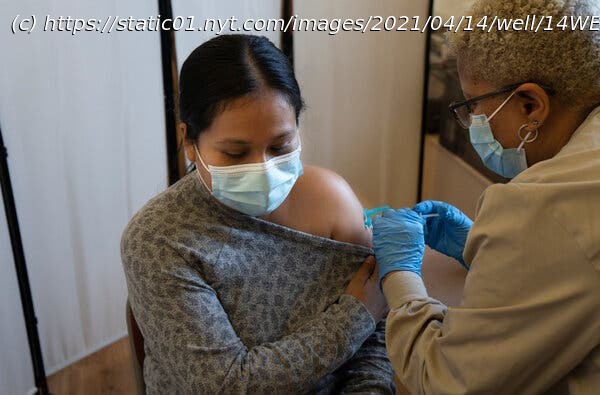Can it affect mammograms or the timing of fertility treatments? What side effects should you look out for? Experts weigh in.
News that six women developed a rare blood clotting disorder after receiving Johnson & Johnson’s Covid-19 vaccine has prompted new questions about whether vaccines affect women differently than men, and whether there are special considerations that women should take into account when getting vaccinated. We spoke with a few experts to learn what women should know as they become eligible to get their shots. Federal health agencies on Tuesday recommended that practitioners pause administering the Johnson & Johnson vaccine after a half-dozen women developed a rare blood clotting disorder about two weeks after vaccination. The recipients were between the ages of 18 and 48; one woman died and a second was hospitalized in critical condition. But it is not clear if the clotting was caused by the vaccines or whether women are necessarily more often affected. In Europe, it initially appeared that women were at greater risk for blood clots associated with the AstraZeneca-Oxford vaccine, which has not been authorized for use yet in the United States, but it turned out that more women were getting the vaccine overall in some countries. British regulators now say that they don’t have evidence to say whether men or women are more likely to be affected by blood clots. Anyone who has a severe headache, abdominal pain, shortness of breath or leg pain after receiving the Johnson & Johnson vaccine should call their health care provider. Coronavirus vaccinations can cause enlarged lymph nodes in the armpit that will show up as white blobs on mammograms. This type of swelling is a normal reaction to the vaccine and will typically occur on the same side as the arm where the shot was given, said Dr. Geeta Swamy, a maternal-fetal medicine specialist and a member of the American College of Obstetricians and Gynecologists’s Covid vaccine group. It usually only lasts for a few weeks. But the vaccine’s effect on mammograms can be concerning to radiologists, she added, because “if someone had breast cancer we might see enlarged lymph nodes as well.” Because this type of swelling could be mistaken as a sign of cancer, the Society of Breast Imaging recommends trying to schedule your routine mammogram before your first Covid-19 vaccine dose or at least one month after your second vaccine dose. “I am particularly eager to get the word out to all the patients undergoing surveillance after successful prior treatment of cancer,” Dr. Constance D. Lehman, who has written about the problem and is the chief of breast imaging at Massachusetts General Hospital, told The New York Times in March. “I can’t imagine the anxiety of getting the scan and hearing, ‘We found a node that is large. We don’t think it’s cancer but can’t tell.’ Or worse, ‘We think it might be cancer.’” But say you are getting a diagnostic mammogram because of a suspicious lump or other symptoms of breast cancer disease or you are someone who had been treated for breast cancer and needs to get regular exams; in those cases, “do not delay,” Dr.






